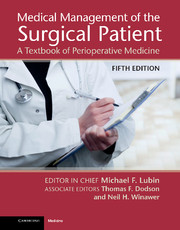Book contents
- Frontmatter
- Dedication
- Contents
- List of Contributors
- Preface
- Introduction
- Part 1 Perioperative Care of the Surgical Patient
- Part 2 Surgical Procedures and their Complications
- Section 17 General Surgery
- Section 18 Cardiothoracic Surgery
- Section 19 Vascular Surgery
- Section 20 Plastic and Reconstructive Surgery
- Section 21 Gynecologic Surgery
- Section 22 Neurologic Surgery
- Section 23 Ophthalmic Surgery
- Section 24 Orthopedic Surgery
- Section 25 Otolaryngologic Surgery
- Section 26 Urologic Surgery
- Chapter 138 Management of upper urinary tract calculi
- Chapter 139 Transurethral resection of the prostate
- Chapter 140 Radical prostatectomy
- Chapter 141 Nephrectomy
- Chapter 142 Cystectomy and urinary diversion
- Chapter 143 Female stress urinary incontinence surgery
- Chapter 144 Vasectomy
- Chapter 145 Inflatable penile prosthesis
- Index
- References
Chapter 139 - Transurethral resection of the prostate
from Section 26 - Urologic Surgery
Published online by Cambridge University Press: 05 September 2013
- Frontmatter
- Dedication
- Contents
- List of Contributors
- Preface
- Introduction
- Part 1 Perioperative Care of the Surgical Patient
- Part 2 Surgical Procedures and their Complications
- Section 17 General Surgery
- Section 18 Cardiothoracic Surgery
- Section 19 Vascular Surgery
- Section 20 Plastic and Reconstructive Surgery
- Section 21 Gynecologic Surgery
- Section 22 Neurologic Surgery
- Section 23 Ophthalmic Surgery
- Section 24 Orthopedic Surgery
- Section 25 Otolaryngologic Surgery
- Section 26 Urologic Surgery
- Chapter 138 Management of upper urinary tract calculi
- Chapter 139 Transurethral resection of the prostate
- Chapter 140 Radical prostatectomy
- Chapter 141 Nephrectomy
- Chapter 142 Cystectomy and urinary diversion
- Chapter 143 Female stress urinary incontinence surgery
- Chapter 144 Vasectomy
- Chapter 145 Inflatable penile prosthesis
- Index
- References
Summary
Transurethral resection of the prostate (TURP), developed in the 1920s, remains the gold standard surgical treatment for benign prostatic hyperplasia (BPH) throughout the world. Over the years, the procedure has undergone significant modifications that improved its efficacy and safety. The most significant recent improvement is bipolar TURP. Conventional monopolar TURP employs hypo-osmolar fluids for irrigation during the procedure. As a result, patients are at risk of developing perioperative dilutional hyponatremia and TUR syndrome, which is a severe form of serum electrolyte and osmolar derangement. Since the new bipolar TURP system utilizes normal saline for irrigation, these risks and complications are completely eliminated. Bipolar TURP thus allows for safer resection.
Indications for transurethral resection of the prostate
Transurethral resection of the prostate is the treatment of choice in patients with moderate to severe BPH symptoms and significant compromise to their quality of life who:
Are unable to tolerate or do not respond to other forms of management (e.g., watchful waiting, medical therapy and/or minimally invasive thermal therapy).
Are experiencing urinary retention thought to be secondary to BPH.
Have recurrent urinary infection secondary to BPH.
Have bladder stones secondary to BPH.
Have renal failure secondary to BPH.
Have recurrent bleeding (gross hematuria) secondary to BPH.
- Type
- Chapter
- Information
- Medical Management of the Surgical PatientA Textbook of Perioperative Medicine, pp. 790 - 793Publisher: Cambridge University PressPrint publication year: 2013



